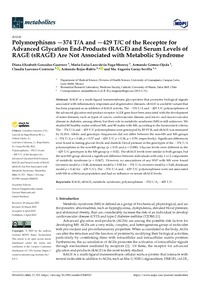Mostrar el registro sencillo de la publicación
Polymorphisms −374 T/A and −429 T/C of the receptor for advanced glycation end-products (RAGE) and serum levels of RAGE (sRAGE) are not associated with metabolic syndrome
| dc.contributor.author | González-Guerrero, Diana E. | |
| dc.contributor.author | Lazo-de-la-Vega-Monroy, María L. | |
| dc.contributor.author | Gómez-Ojeda, Armando | |
| dc.contributor.author | Luévano-Contreras, Claudia | |
| dc.contributor.author | Rojas, Armando | |
| dc.contributor.author | Garay-Sevilla, Ma. Eugenia | |
| dc.date.accessioned | 2023-05-10T16:45:53Z | |
| dc.date.available | 2023-05-10T16:45:53Z | |
| dc.date.issued | 2023 | |
| dc.identifier.uri | http://repositorio.ucm.cl/handle/ucm/4766 | |
| dc.description.abstract | RAGE is a multi-ligand transmembrane glycoprotein that promotes biological signals associated with inflammatory responses and degenerative diseases. sRAGE is a soluble variant that has been proposed as an inhibitor of RAGE activity. The −374 T/A and −429 T/C polymorphisms of the advanced glycation end-product receptor AGER gene have been associated with the development of some diseases, such as types of cancer, cardiovascular disease, and micro- and macro-vascular disease in diabetes, among others, but their role in metabolic syndrome (MS) is still unknown. We studied 80 healthy males without MS, and 80 males with MS, according to the harmonized criteria. The −374 T/A and −429 T/C polymorphisms were genotyped by RT-PCR, and sRAGE was measured by ELISA. Allelic and genotypic frequencies did not differ between the non-MS and MS groups (−374 T/A p = 0.48, p = 0.57 and −429 T/C p = 0.36, p = 0.59, respectively). Significant differences were found in fasting glucose levels and diastolic blood pressure in the genotypes of the −374 T/A polymorphism in the non-MS group (p < 0.01 and p = 0.008). Glucose levels were different in the −429 T/C genotypes in the MS group (p = 0.02). The sRAGE levels were similar in both groups, but the non-MS group showed a significant difference between individuals with only 1 or 2 components of metabolic syndrome (p = 0.047). However, no associations of any SNP with MS were found (recessive model p = 0.48, dominant model p = 0.82 for −374 T/A; recessive model p = 0.48, dominant model p = 0.42 for −429 T/C). The −374 T/A and −429 T/C polymorphisms were not associated with MS in a Mexican population and had no influence on serum sRAGE levels. | es_CL |
| dc.language.iso | en | es_CL |
| dc.rights | Atribución-NoComercial-SinDerivadas 3.0 Chile | * |
| dc.rights.uri | http://creativecommons.org/licenses/by-nc-nd/3.0/cl/ | * |
| dc.source | Metabolites, 13(4), 521 | es_CL |
| dc.subject | RAGE | es_CL |
| dc.subject | sRAGE | es_CL |
| dc.subject | Metabolic syndrome | es_CL |
| dc.subject | Polymorphisms −374 T/A | es_CL |
| dc.subject | −429 T/C | es_CL |
| dc.title | Polymorphisms −374 T/A and −429 T/C of the receptor for advanced glycation end-products (RAGE) and serum levels of RAGE (sRAGE) are not associated with metabolic syndrome | es_CL |
| dc.type | Article | es_CL |
| dc.ucm.facultad | Facultad de Medicina | es_CL |
| dc.ucm.indexacion | Scopus | es_CL |
| dc.ucm.indexacion | Isi | es_CL |
| dc.ucm.uri | mdpi.com/2218-1989/13/4/521 | es_CL |
| dc.ucm.doi | doi.org/10.3390/metabo13040521 | es_CL |



